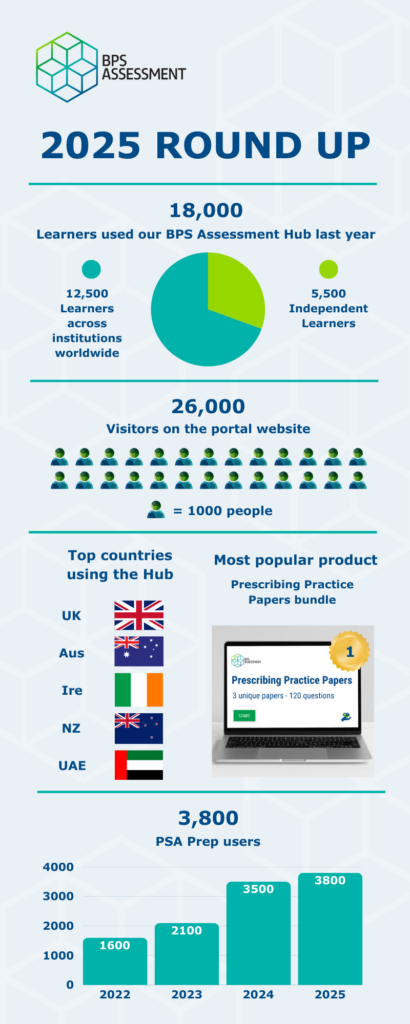If you’re preparing for the Prescribing Safety Assessment (PSA), you’re not alone! Thousands of students will take it between October 2025 and June 2026. Knowing exactly what to expect on the day can make a huge difference to your confidence and performance.
In this post, we’ll take a deep dive into each PSA question type, how they’re structured, how many marks they carry, and roughly how long you should spend on each.
The PSA exam structure at a glance
The PSA is a two-hour, online assessment designed to test your prescribing competence. You’ll face 60 questions in total, divided across eight different sections, with a combined total of 200 marks.
We’ve included a simple table breakdown below:
| Question Type |
Number of Questions |
Marks per Question |
Total Marks |
| Prescribing (PWS) |
8 |
10 |
80 |
| Prescription Review (REV) |
8 |
4 |
32 |
| Planning Management (MAN) |
8 |
2 |
16 |
| Providing Information (COM) |
6 |
2 |
12 |
| Calculation Skills (CAL) |
8 |
2 |
16 |
| Adverse Drug Reactions (ADR) |
8 |
2 |
16 |
| Drug Monitoring (TDM) |
8 |
2 |
16 |
| Data Interpretation (DAT) |
6 |
2 |
12 |
Total: 60 questions, 200 marks, 120 minutes.
Because the Prescribing section alone accounts for 40% of the total marks, managing your time effectively across each section is crucial!
PSA exam question types explained
Below, we’re taking a deep dive into what each question type involves, what it’s testing, and a suggested time allocation for each.
1. Prescribing (PWS) questions
8 questions | 10 marks each | 80 marks total
These are the heart of the PSA and the highest-scoring section. You’ll be asked to prescribe a drug based on a clinical scenario, using a digital prescription form.
Each prescription must be complete, including the drug name, dose, route, and frequency, and needs to be clinically appropriate for the patient’s condition, age, and comorbidities.
Top tip: Always check for contraindications, allergies, and interactions using the BNF (which you’ll have access to in some form during the exam).
Allotted time suggestion: Around 7 – 8 minutes per question (≈ 55 – 60 minutes total).
2. Prescription Review (REV) questions
8 questions | 4 marks each | 32 marks total
Here, you’ll review an existing prescription chart and identify any problems such as dosing errors, drug interactions, or missing information. You may need to choose what action to take or to correct an error.
Top tip: Be methodical, check each medication for indication, dose, route, and frequency before deciding what to change.
Allotted time suggestion: 3 – 4 minutes per question (≈ 28 – 30 minutes total).
3. Planning Management (MAN) questions
8 questions | 2 marks each | 16 marks total
You’ll be asked to choose the most appropriate next step in a patient’s management from several options, for example, which treatment to start, adjust, or stop.
Top tip: Read everything carefully; small details often change the correct answer.
Allotted time suggestion: 1.5 minutes per question (≈ 12 minutes total).
4. Providing Information (COM) questions
6 questions | 2 marks each | 12 marks total
These test how you communicate with patients about their medicines. You might be asked what key advice to give when starting or stopping a treatment.
Top tip: Think about what a patient needs to know to use their medicine safely. Think, side effects, monitoring, and administration tips.
Allotted time suggestion: 1.5 minutes per question (≈ 9 minutes total).
5. Calculation Skills (CAL) questions
8 questions | 2 marks each | 16 marks total
You’ll calculate doses, infusion rates, or conversions. A simple calculator is provided in the exam interface, but many students find it faster to use their own.
Top tip: Double-check units and make sure your final answer makes clinical sense, is it a realistic dose?
Allotted time suggestion: 2 minutes per question (≈ 16 minutes total).
6. Adverse Drug Reactions (ADR) questions
8 questions | 2 marks each | 16 marks total
You’ll interpret clinical scenarios to identify, manage, or prevent adverse drug reactions.
Questions might ask you to:
- Identify which drug caused a patient’s new symptoms
- Recognise a drug interaction
- Decide on the best course of action after an adverse event
Top tip: Be ready to apply your pharmacology knowledge, and don’t forget to use the BNF interactions checker.
Allotted time suggestion: 1.5 – 2 minutes per question (≈ 12 – 16 minutes total).
7. Drug Monitoring (TDM) questions
8 questions | 2 marks each | 16 marks total
These assess how well you understand drug monitoring, knowing which tests to request, when to measure levels, and how to interpret results.
Top tip: Pay attention to trends in results (e.g. renal function) that might change drug safety or dosing.
Allotted time suggestion: 1.5 minutes per question (≈ 12 minutes total).
8. Data Interpretation (DAT) questions
6 questions | 2 marks each | 12 marks total
You’ll analyse patient data such as lab results, drug levels, or vital signs (usually in the form of a graph or table) to make safe prescribing decisions.
Top tip: Look for patterns and remember, practice makes perfect!
Allotted time suggestion: 1.5 minutes per question (≈ 9 minutes total).
Making the most of your 2 hours
Here’s how your time might look if you stick roughly to the suggested timings:
| Section |
Time (approx.) |
| Prescribing |
55 – 60 min |
| Prescription Review |
25 – 30 min |
| All other sections combined |
30 – 35 min |
| Total |
≈120 min |
Try to stay calm, mark for review, and move on if you’re stuck. Remember to leave a few minutes at the end to check the questions you’ve flagged. The prescribing section carries the most marks, but smaller sections can help boost your score if you answer efficiently.
Understanding the structure and weighting of PSA question types can transform how you prepare, helping you focus on high-yield sections, so plan your time wisely and walk into the exam with confidence.
For more guidance, explore the rest of our blogs on the Portal Post or our catalogue of free-to-use resources, including our 9 free eLearning resources specifically designed to support those sitting the PSA (PSA Prep).
Good luck, you’ve got this!
 As we look forward to another year of supporting learners across the UK and beyond to become confident, safe prescribers, we’re taking a moment to celebrate the BPS Assessment community and reflect on the growth and achievements of 2025.
As we look forward to another year of supporting learners across the UK and beyond to become confident, safe prescribers, we’re taking a moment to celebrate the BPS Assessment community and reflect on the growth and achievements of 2025.






